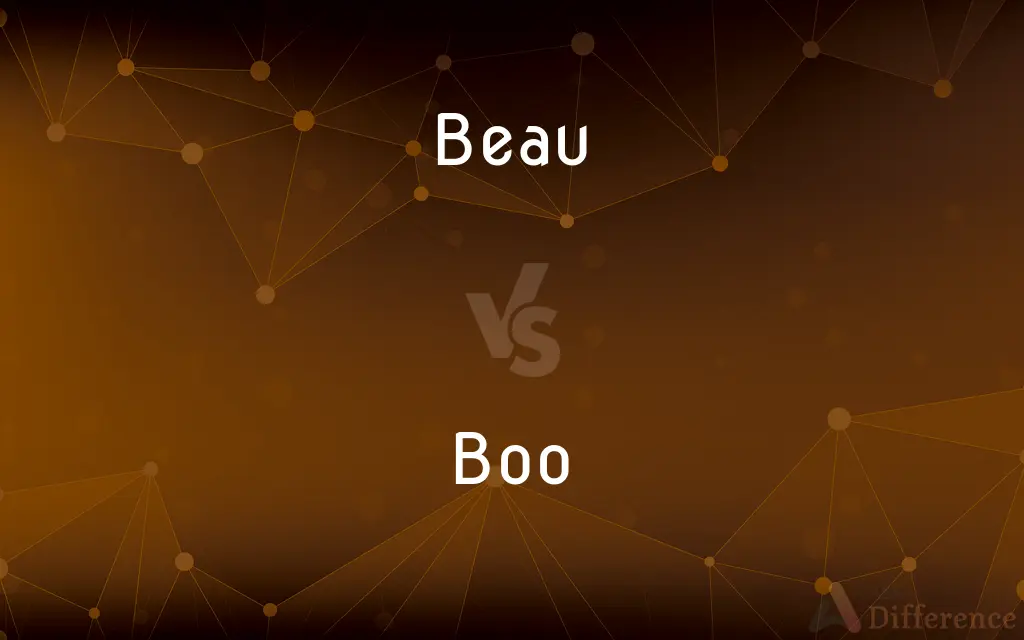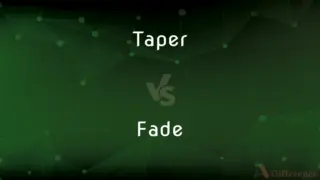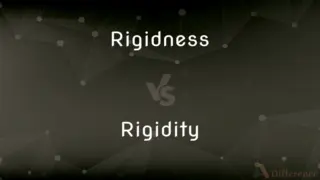Beau vs. Boo — What's the Difference?
By Maham Liaqat & Fiza Rafique — Updated on April 3, 2024
Beau refers to a male admirer or boyfriend, highlighting romance, while Boo is an affectionate term for a significant other or used to express disapproval.

Difference Between Beau and Boo
Table of Contents
ADVERTISEMENT
Key Differences
Beau traditionally signifies a male admirer or romantic interest, often implying a certain level of formality and old-fashioned charm. On the other hand, Boo is a term of endearment that transcends gender and formality. It's versatile, used to refer to a significant other, friend, or even in playful settings.
While "beau" has historical roots dating back to when courtship was a formal process, involving rituals and societal norms, "boo" represents a shift towards informal, personal connections. This distinction highlights the evolution of language and relationships over time, where "beau" speaks to a structured approach to romance, and "boo" embraces spontaneity and emotional intimacy.
Beau is often associated with a specific image of masculinity and charm, indicative of a suitor who is attentive and traditionally romantic. In contrast, "boo" is gender-neutral and does not connote any particular behavior or characteristic, emphasizing the affectionate aspect of the relationship over societal expectations of romance.
In usage, "beau" might appear in more formal or written contexts, such as literature or formal announcements of engagement, reflecting its classic connotation. "Boo," conversely, thrives in everyday conversation, texts, and social media, showcasing its adaptability and enduring popularity in casual and intimate expressions of love.
Comparison Chart
Gender Association
Primarily male
Gender-neutral
ADVERTISEMENT
Formality
Formal, traditional
Casual, modern
Usage Context
Often used in literature and formal settings
Common in everyday speech and online
Connotation
Romantic interest with a hint of old-fashioned charm
Affectionate term for a loved one or expression of disapproval
Implication
Implies courtship and gentlemanly behavior
Implies closeness and personal connection
Compare with Definitions
Beau
A man who is particularly attentive to his appearance.
The beau at the gala wore a tailored suit that caught everyone's eye.
Boo
A casual nickname for someone you care about deeply.
Boo, can you pass me the remote?
Beau
A term used historically to refer to a wealthy, fashionable young man.
The novel's protagonist was a beau of the highest order, attending every social event in town.
Boo
A term of endearment for a significant other, friend, or child.
I'm going out to dinner with my boo tonight.
Beau
A male admirer or boyfriend.
She introduced her beau to her parents at the dinner party.
Boo
Used to express disapproval or to scare someone, often in a playful manner.
The kids yelled boo! at the scary movie.
Beau
In older use, a frequent and attentive male companion.
Her beau escorted her to the theater every Friday night.
Boo
In urban slang, a close or best friend.
We've been boos since high school; we share everything.
Beau
A term of endearment for a male romantic partner in certain English-speaking regions.
She wrote a love letter to her beau, expressing her deepest feelings.
Boo
A term used in digital communication to signify affection.
Goodnight, boo.
Beau
A boyfriend or male admirer.
Boo
A sound uttered to show contempt, scorn, or disapproval.
Beau
A rich, fashionable young man; a dandy.
Boo
(Informal) Any sound or word
You never said boo to me about overtime.
Beau
A dandy; a fop.
Boo
A boyfriend or girlfriend.
Beau
(dated) A man with a reputation for fine dress and etiquette; a dandy or fop.
Boo
A spouse.
Beau
(dated) A male lover; a boyfriend.
Boo
Used as a term of endearment for such a person.
Beau
A male escort.
Boo
Marijuana.
Beau
A suitor of a lady.
Boo
Used to express contempt, scorn, or disapproval or to frighten or surprise another.
Beau
A man who takes great care to dress in the latest fashion; a dandy.
Boo
To utter a boo.
Beau
A man who escorts, or pays attentions to, a lady; an escort; a suitor or lover.
Boo
To express contempt, scorn, or disapproval of by booing
Booed the singer off the stage.
Beau
A man who is the lover of a girl or young woman;
If I'd known he was her boyfriend I wouldn't have asked
Boo
A loud exclamation intended to scare someone, especially a child. Usually used when one has been hidden from the victim and then suddenly appears unexpectedly.
Beau
A man who is much concerned with his dress and appearance
Boo
Used ironically in a situation where one had the opportunity to scare someone by speaking suddenly.
Boo
An exclamation used by a member or many members of an audience, as at a stage play or sports game, to indicate derision or disapproval of what has just occurred.
Boo
A derisive shout made to indicate disapproval.
Boo
A close acquaintance or significant other.
Boo
A tail feather from an ostrich.
Boo
(intransitive) To shout extended boos derisively.
When he took the podium, the crowd booed.
Boo
(transitive) To shout extended boos at, as a form of derision.
The protesters loudly booed the visiting senator.
Boo
To make a sound characteristic of cattle; to moo.
Boo
To show displeasure (after a performance or speech) by making a prolonged sound of "boo".
Boo
A cry or noise made to express displeasure or contempt
Boo
Show displeasure, as after a performance or speech
Common Curiosities
Can "boo" be used for both males and females?
Yes, "boo" is gender-neutral and can be used affectionately for people of any gender.
Is "beau" outdated?
While less common today, "beau" is still used, especially in formal or literary contexts, retaining its classic charm.
Is "beau" only applicable to romantic interests?
Primarily, yes, though historically it has also denoted a well-dressed or fashionable young man.
How did "boo" come to express disapproval?
The expression of disapproval is a different usage of "boo," likely derived from the sound made to startle or express dissatisfaction in a crowd.
How do cultural differences affect the use of "boo"?
Cultural and regional variations influence how widely and in what contexts "boo" is used as a term of endearment.
Why is "boo" popular in digital communication?
Its short, affectionate nature makes it easy and popular for expressing love or affection in texts and online.
Is there a difference in the seriousness of relationships when using "beau" vs. "boo"?
"Beau" might imply a more formal or serious relationship due to its traditional connotations, whereas "boo" is more casual.
What does "beau" signify in a relationship?
It signifies a male admirer or romantic partner, often with a traditional and charming connotation.
Can "boo" be used in formal communication?
"Boo" is generally used in casual or intimate contexts and might not be appropriate for formal communication.
Can "beau" refer to a female partner?
Traditionally, "beau" refers to a male partner, but language evolves, and its use can be flexible.
What is the historical origin of "beau"?
"Beau" comes from French, meaning "beautiful" or "handsome," and has been used in English to denote male admirers.
Is "beau" specific to any culture?
While it originates from French, "beau" has been adopted into English and is used in various English-speaking cultures.
How does "boo" reflect modern relationships?
Its casual and inclusive use reflects more relaxed and personal approaches to expressing affection in contemporary relationships.
Can "boo" be used to address children?
Yes, it's often used as a term of endearment for children as well.
How do "beau" and "boo" reflect changes in language over time?
"Beau" reflects older, more formal courtship traditions, while "boo" embodies the evolution towards more casual, inclusive expressions of affection.
Share Your Discovery

Previous Comparison
Taper vs. Fade
Next Comparison
Rigidness vs. RigidityAuthor Spotlight
Written by
Maham LiaqatCo-written by
Fiza RafiqueFiza Rafique is a skilled content writer at AskDifference.com, where she meticulously refines and enhances written pieces. Drawing from her vast editorial expertise, Fiza ensures clarity, accuracy, and precision in every article. Passionate about language, she continually seeks to elevate the quality of content for readers worldwide.














































